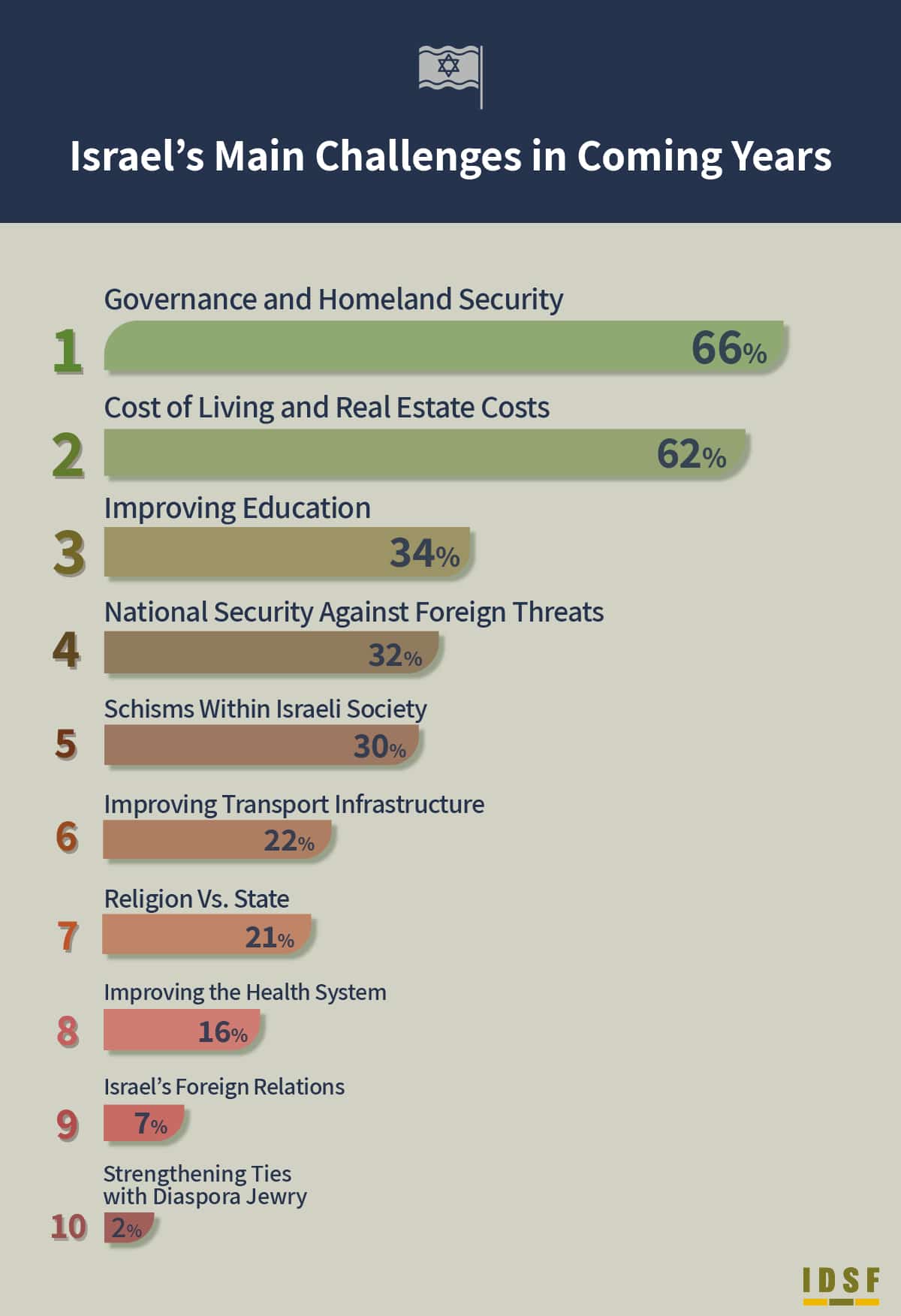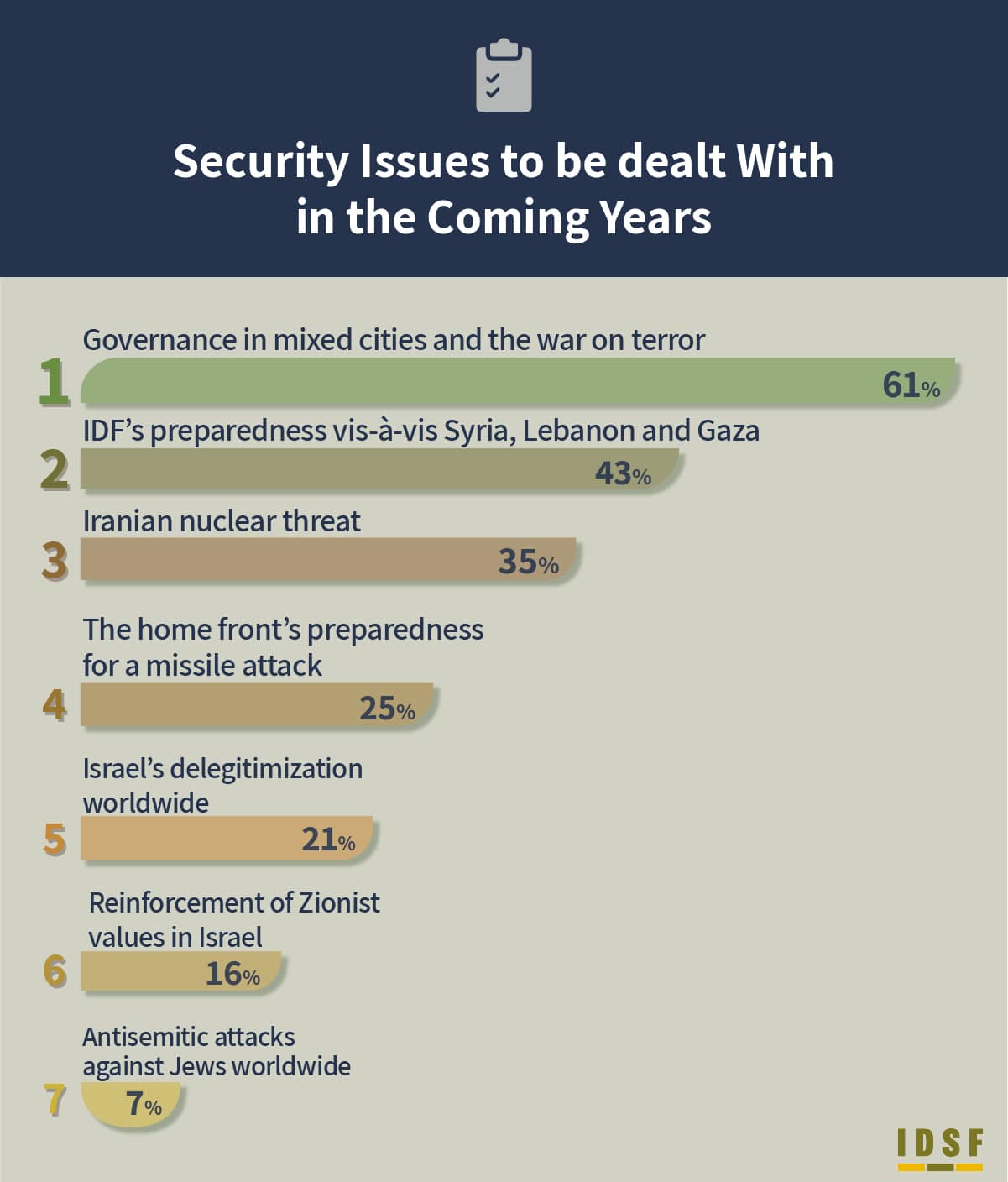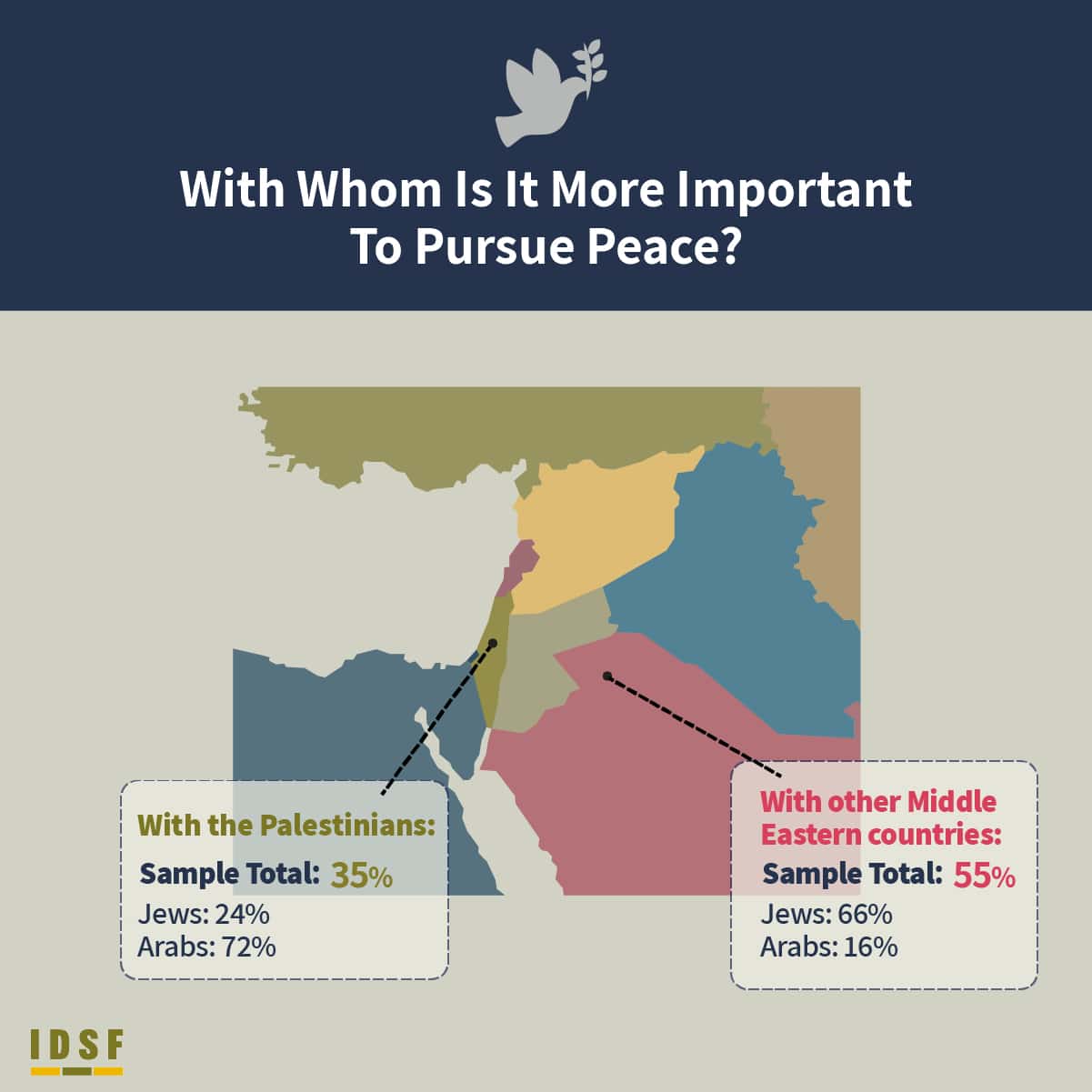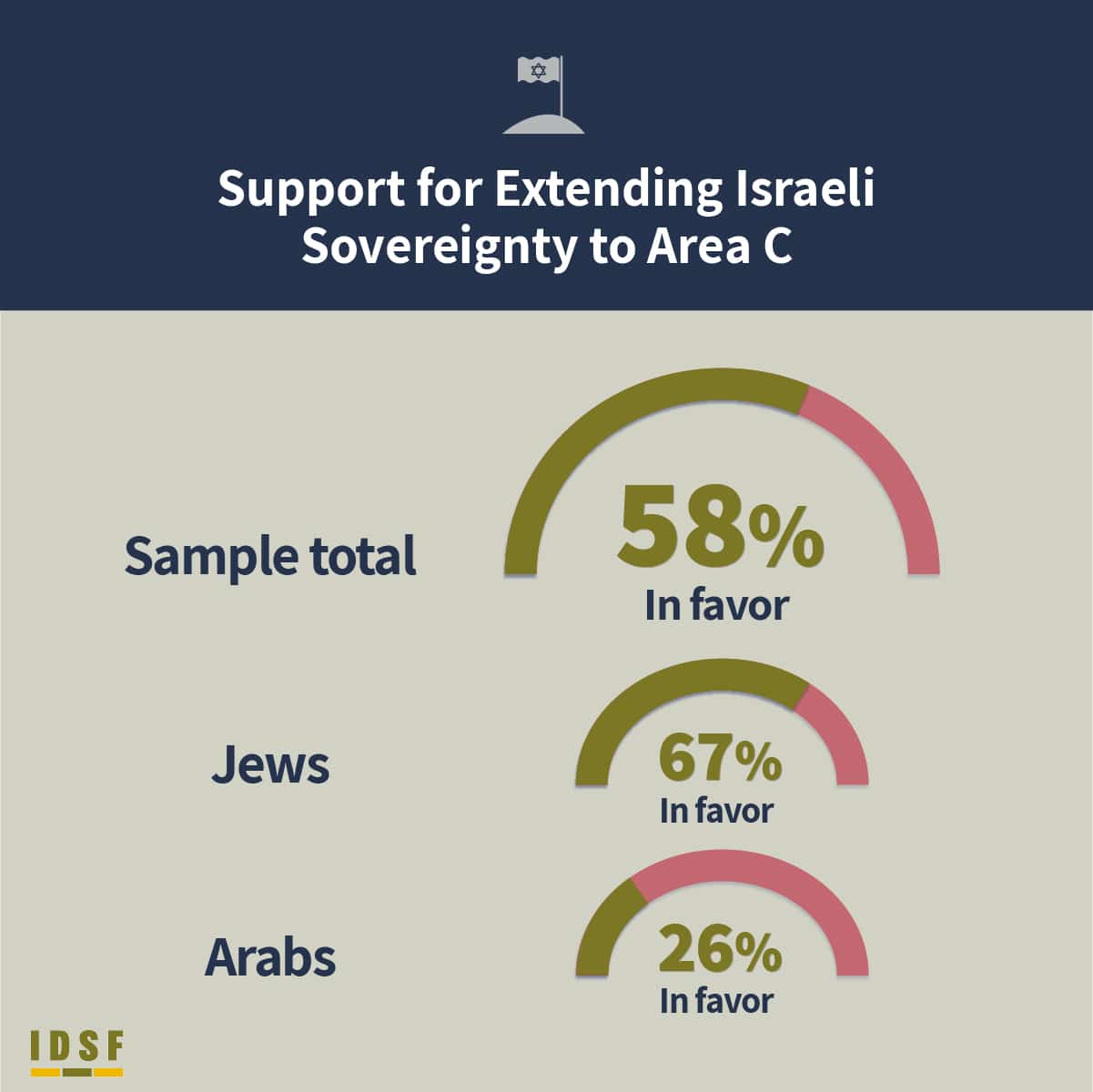Last November Israelis were called to the ballot boxes for the fifth time in three years. The world views within the opposing political camps were different, sometimes even diagonally opposing one another, however everyone hoped that this time a stable government would successfully emerge. The government has been set up, and the challenges it faces are numerous. This time the IDSF Index has dealt precisely with this issue: how does Israeli public opinion perceive the key challenges facing Israel, and what issues should the newly-established government prioritize.
The survey was conducted by the Research Department with statistical support from Dr. Hagay Elkayam. 1,059 respondents were sampled – adult (over 18 years of age) Internet users in Israel, and has been reviewed to ensure fair representation in terms of age, gender, nationality, religion, and political affiliation. For the integrated sample (1,059 respondents) the maximum sampling margin of error is ±3.01% with a 95% probability. For the Jewish sample (802 respondents) the maximum sampling margin of error is ±3.46% with a 95% probability. For the Arabic survey (258 respondents) the maximum sampling margin of error is ±6.1% with a probability of 95%.
The Key Challenges: Governance, Personal Security and Homeland Security
Following a three-year political stalemate, the public sentiment is that now the time has come for action. The question is – where would the public most want to see real change.
The answers indicate that the top priority is governance, personal security and homeland security (66%). This is followed by the cost of living and housing costs (62%), improvement of the education system (34%), Israel’s security vis-à-vis external threats (32%), the schisms tearing Israeli society apart (30%), improving the transport infrastructure in Israel (22%), State versus Religion (21%), improving the health system (16%), Israel’s foreign relations (7%), and finally – strengthening of the ties with the diaspora Jews with only 2%.
Segmented by nationality, governance and homeland security top the list among the Jews with 71%, while among the Arabs this issue receives only 48%. For Arab society, the most burning issue is surprisingly the cost of living and real estate prices, which chalked up 84%, as opposed to only 57% among Jewish respondents.
On top of that, one must wonder why strengthening ties with Diaspora Jewry, which throughout history has proven indispensable to our national resilience, has landed at the bottom of the list. This fact is a concern to us as a movement, since there is a dramatic campaign rolling out worldwide, which affects millions of Jews whose existence is now at risk due to incidents of anti-Semitism and assimilation, and we would like to remind our policymakers just how important it is to revamp the conversion system, to strengthen the Zionist ethos, to stimulate Aliya, to combat delegitimization in the media and to deal with anti-Semitism.
The Biggest Threats: From the Closest to the Remotest
One of the most significant conclusions arising from the ranking of the national challenges is that homeland security is at the top of the Israeli public’s list of priorities with 66%, whereas state security vis-à-vis foreign threats totaled less than half of that – 32%.
We drilled down and asked which aspect of security is most important to the Israeli public. Topping the list is governance in mixed cities and the war against terrorism (61%), then comes the IDF’s preparedness against Syria, Lebanon and Gaza (43%), the Iranian nuclear threat (35%), the home front’s preparedness for a missile attack (25%), Israel’s delegitimization worldwide (21%), reinforcement of Zionist values in Israel (16%), and at the bottom of the list – anti-Semitism targeting Jews around the world (7%).
One of the insights from this ranking is that the Israeli public, quite naturally, ranks the threats to be dealt with from the closest to the remotest. In other words, first of all the most pressing, most urgent threats must be dealt with – those which are in our midst and which we sense on a daily basis. We then need to deal with the direct enemies surrounding us, and then we will also be able to deal with the Iranian threat. Reality, however, is more complicated since the threats are interconnected. Clearly, however, the public expects personal security first and foremost.
A New Middle East: The Thing That Hath Been, is Not That Which Shall Be
A recurring claim is that without peace with the Palestinians – our closest neighbors – there is no way to make progress and achieve peace with the Arab countries in the Middle East, our more remote neighbors. This claim was debunked when the State of Israel signed normalization pacts with the United Arab Emirates and Bahrain in 2020, followed by Sudan and Morocco. With this state of affairs in mind, we asked the Israeli public what is more important – to pursue peace with the Palestinians – or perhaps to seek peace with other Middle Eastern countries.
55% of the Israeli public believe it is more important to pursue peace with Middle Eastern countries, compared with only 35% that believe we have got to make peace with the Palestinians first (the rest responded “Don’t know”). When segmenting the answers by nationality, the differences between Jews and Arabs come into clear relief: whereas among Jews 66% prefer peace treaties with Middle Eastern countries and 24% believe we ought to make peace with the Palestinians, within Arab society 16% believe it is more important to pursue peace with Middle Eastern countries compared with 72% that believe the Palestinian peace should take precedence.
Judea and Samaria: The Majority Favors Annexation of Area C
After the Six-Day War, the Israeli government decided not to apply Israeli law on Judea and Samaria. The implications of this decision have had mixed consequences. One of the greatest controversies about Judea and Samaria is whether Israeli law ought to be applied there.
In our survey, we examined to what extent Israeli public opinion supports the application of Israeli sovereignty over Area C, in other words – in territories under Israeli civil and security control, totaling approximately 60% of Judea and Samaria (for further reading on the differences between Area A, Area B and Area C, look here). The responses show that 58% of the Israeli public supports application of Israeli sovereignty over Area C. When segmenting by nationality, 67% of all Jews support such a move and no less than 26% of Israeli Arabs also support extending Israeli sovereignty over Area C.
In other words, most Jews regard Area C in Judea and Samaria to be an integral part of the State of Israel, where Israeli law ought to be applied to all intents and purposes. It is noteworthy that no less than a quarter of Israel’s Arabs also support this move.
The Message from the Public: Deal With Homeland Security Issues
“The issue of governance and homeland security has been on the backburner for way too long, a fact that has exacted a heavy price in the real world: the level of governance in the country is scandalous and the public feels this” – so sums it up the Founder-Chairman of the IDSF, Brigadier-General (Res.) Amir Avivi. “The Israeli public is smart. Governance and homeland security is indeed critical to Israel’s resiliency. As we saw in May 2021, when the homeland security vector intersects with the vector of foreign war, the results can be disastrous. In this sense, individual security and national security are inseparable.
The undisputable conclusion is that we have got to rearrange our national priorities and place homeland security substantially higher on the list than where it has been so far. The IDSF is hard at work to make this happen”.










